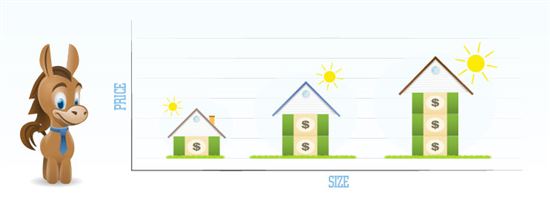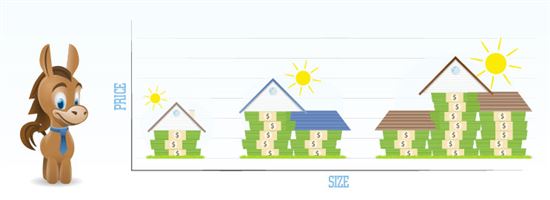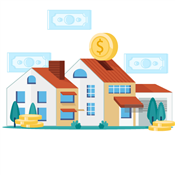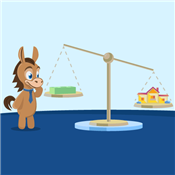How Much Money Do You Need to Buy a House?
Besides the down payment, there are many other fees that you may not have considered. Prepare yourself for all the costs of purchasing a home.
 |
How Much Cash You Really Need
 |
| © CreditDonkey |
Buying a house means more than saving for a down payment. Your down payment is part of the equation. But there are other costs to cover.
Lenders, appraisers, and moving companies all have their hands out waiting for money. Before you shop for a home, make sure you have the money to cover the many expenses the process includes:
- Closing costs
- Prepaid expenses
- Cost of physically moving
- Costs of starting life in a new home
- Mortgage insurance
At CreditDonkey, we recommend sitting down with a pen and paper (or excel spreadsheet) and crunching the numbers. You need to see what moving will really cost you. This way, you are best prepared when it comes time to move. Honestly, this step can prevent you from losing your dream home.
And don't forget that mortgage rates are a huge piece of the housing cost puzzle. Do your research and save money by getting a lower mortgage rate.
Down Payment Requirements
 |
| © CreditDonkey |
What is a reasonable down payment? Most loan programs require some type of down payment. The amount you may need varies between 3 and 20 percent. Your credit score, current debt load, and chosen loan program help to determine how much you need to put down. In general, the following minimum down payment requirements prevail:
- Conventional loans require a 5% minimum down payment in most cases.
- FHA loans require a 3.5% minimum down payment. These government-backed loans have lower credit score requirements and flexible underwriting guidelines.
- VA loans do not require a down payment. However, you must be a veteran with adequate service time and an honorable discharge.
- USDA loans do not require a down payment. However, you must purchase a home in a designated rural area as designated by the U.S. Department of Agriculture.
If you don't put 20% down on a home and have conventional financing, you will pay PMI, or Private Mortgage Insurance. This is an added expense on your monthly mortgage payment. You pay PMI until your loan equals less than 80% of the value of your home. For FHA loans, PMI cannot be canceled. The only way out is to refi once you have sufficient equity.
- Improve your credit score
- Determine how much house you can afford
- Save for a down payment
- Get approved for a home loan
- Buy your first home
FHA and USDA loans also require annual Mortgage Insurance payments. You make the payments monthly, just like a conventional loan. The difference, however, is the MI on a government-backed loan lasts for the life of the loan.
There are other opportunities for loans which offer low down payment options through the federal government which also require mortgage insurance. It is important to determine if that PMI can be canceled, or if it is ongoing through the life of the loan. These programs include the Conventional 97% Loan To Value Program, the HomePath ReadyBuyer Program, and the Good Neighbor Next Door (GNND) Program. In addition to down payments that are lower than the FHA requirement of 3.5%, these programs also offer other benefits to cash strapped buyers. The Home ReadyBuyer Program offers a rebate of up to 3% in closing costs if you take their $75 course on home buying prior to submitting an offer, and the Conventional 97 has mortgage insurance that is able to be canceled once the equity reaches 78% or below.
Earnest Money - How It Works
Immediately upon signing the sales contract, you may need earnest money. This money serves as proof that you truly intend to purchase the home and aren't shopping around. The earnest money is not an additional down payment - it'll be deducted from your down payment at the closing. Just know that it's possible that you may need access to funds early on in the process.
Not every home purchase transaction requires earnest money. If a seller requires earnest money, it varies between 1 and 3 percent of the agreed upon purchase price. You do not give the money directly to the seller. Instead, a third-party holds the money in an escrow account. If the sale falls through, the seller keeps the earnest money.
Just how much earnest money do you need to provide? It depends on a variety of factors:
- The number of bids on the home: are you in a bidding war or are you the only bidder?
- The status of the market: in a hot real estate market, sellers may want more earnest money to avoid losing the sale.
- The norm for the area: sellers tend to follow the trends - if other sellers require earnest money, then they will too.
Once you close on the home, the closing agent applies the money held in escrow towards your down payment or closing costs.
The Cost of Closing on a Loan
Closing costs are where you really need to pay attention. The upfront costs of closing a loan can quickly add up to 5 percent of the price of the home in some areas. On a $200,000 loan, this means $10,000. It is a good idea to compare costs from 3 lenders before choosing one.
There are lender costs and third-party charges. The most common lender charges include:
- Application
- Processing
- Underwriting
- Credit report
- Document preparation
- Courier
- Origination points
- Discount points
- Rate lock
You have the right to see a lender's charges within 3 business days of providing them with a loan application. The lender will send you a Loan Estimate, which details these costs. Carefully review the estimate to see what each lender charges.
The most common third-party charges include:
- Appraisal
- Title search
- Title insurance
- Survey
- Inspections (home and pest)
- Flood zone determination
- Transfer taxes
Many of the fees you have no say in - you have to pay them. For example, an appraisal is necessary in order for the lender to ensure the home is worth enough. If the lender funded a loan without enough collateral, they could lose money. The title search is also necessary to make sure ownership can transfer seamlessly.
The charges you have a say in are the survey, home inspection (in some cases), and pest inspection. These fees can total up to $1,000 between the three (sometimes more), but they protect your future investment. For example, a pest inspection helps you determine if there is any termite damage. Wouldn't you rather know about this damage before purchasing the home? If there is damage, you can negotiate with the seller to make the necessary changes. In some cases, you can back out of the purchase altogether.
Covering the Prepaid Expenses
Prepaid expenses often cause confusion. Why would you prepay for anything on a home? The amount you must pay will vary based on your location and the exact circumstances. The most common prepaid expense is mortgage interest. Anyone borrowing money for their home will pay this expense.
When you pay mortgage interest in your monthly mortgage payments, you pay interest for the month preceding your payment. For example, December's mortgage payment covers the interest for November. Let's say you close on your loan on May 15th. You will not have to make a mortgage payment until July 1st. This means your first mortgage payment covers the interest from June 1st-June 30th. This still leaves the interest from May 15th-May 31st unpaid. You pay this expense at the closing, which is why it is a "prepaid expense."
A few other prepaid expenses you may come across include:
- Homeowner's association dues. If the seller paid annual homeowner's association dues, you may have to reimburse him for the months that haven't occurred yet.
- The timing of your closing and the due date of your real estate taxes determine if have to prepay your taxes. If there is not a full six months before your real estate taxes are due, you may have to prepay. This means stocking your escrow account with additional funds. This way you have enough to cover the taxes when they are due.
- Homeowner's insurance. Every buyer must pay the first year of homeowner's insurance premium at the closing.
Cash Reserve Requirements
Cash reserves are something not every lender requires, but you should consider anyway. Think of it as an emergency fund. What would happen if you lost your job or suddenly became ill? How would you pay your mortgage each month? Cash reserves can help you out.
Some mortgage programs require a certain amount of cash reserves or you cannot close on the loan. It depends on the lender, the loan program, and your risk level. The riskier you are to the lender, the more cash reserves help.
Cost of Moving
Don't forget about the fact that physically moving costs money. Whether you hire professional movers or bribe a group of friends with pizza and beer, it still costs money. The average move today costs between $1,500 and $5,000; the amount you pay depends on how much stuff you have and how far you move. Obviously, an out-of-state move would cost more than a move that is just a few miles down the road.
Pay close attention to the quotes movers provide you. Some companies charge by the hour, while others charge a flat fee but limit the time allotted. If you want to save money on moving expenses, move during off peak times. Usually before May and after September offer the greatest discounts.
Keep in mind that even if you plan to do the work yourself, you still have to pay for things like:
- Renting the truck
- Insurance on the truck
- Gas
- Any storage containers you need
- Moving boxes
Rick Sharga, Executive Vice President, Carrington Mortgage Holdings
Miscellaneous Costs
You always want to have room for those miscellaneous costs. These costs can change and depend on your needs. You can likely put off many of them if you cannot afford it right now, but you're probably going to want to put money toward the following:
- Furnishings
- Appliances
- Decorations
- Utility connection fees
Bottom Line
 |
| © CreditDonkey |
Buying a home is costly. You must cover many expenses aside from the down payment. Exactly how much money you need depends on many factors. Timing, the standard costs for your area, and the state of the housing market all play important roles. Checking with several lenders can give you an idea of the norm for your area. Remember, this is one of the largest investments of your life. Take your time deciding which lender and loan program works for you.
Write to Kim P at feedback@creditdonkey.com. Follow us on Twitter and Facebook for our latest posts.
Note: This website is made possible through financial relationships with some of the products and services mentioned on this site. We may receive compensation if you shop through links in our content. You do not have to use our links, but you help support CreditDonkey if you do.
|
|
| ||||||
|
|
|







